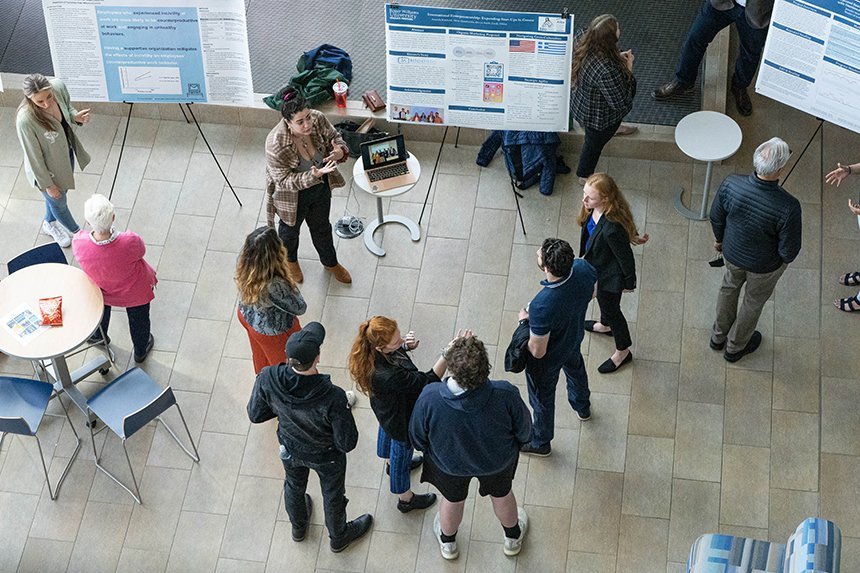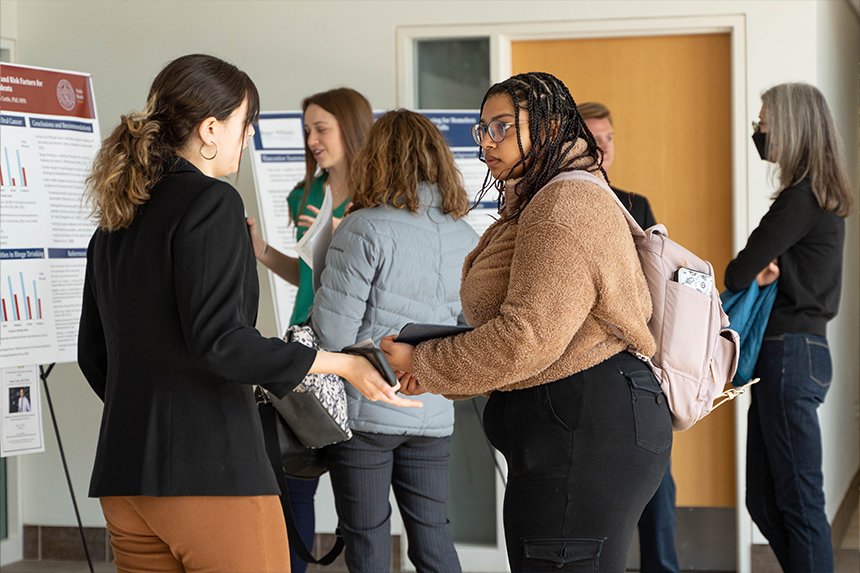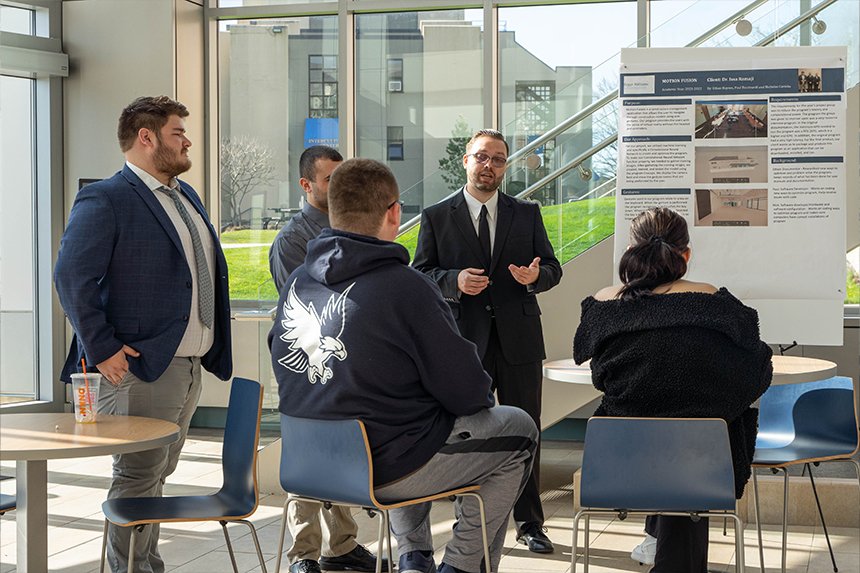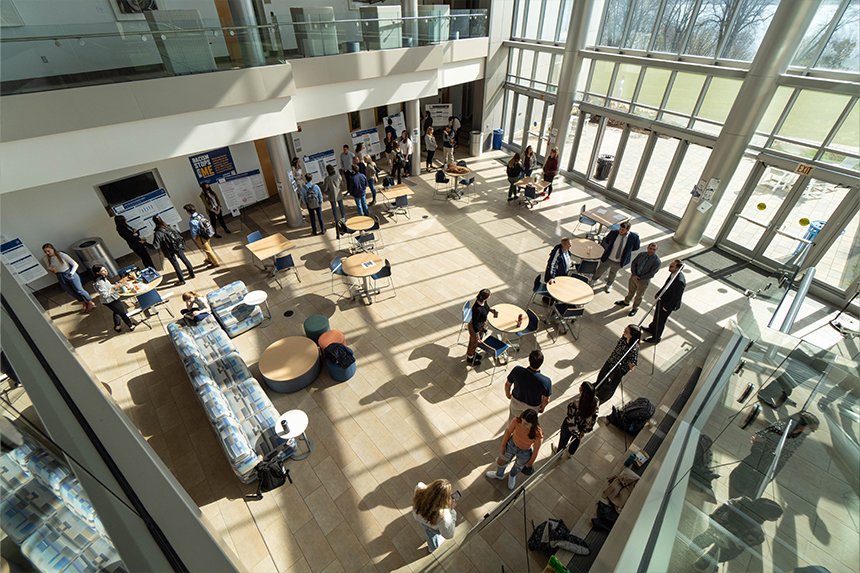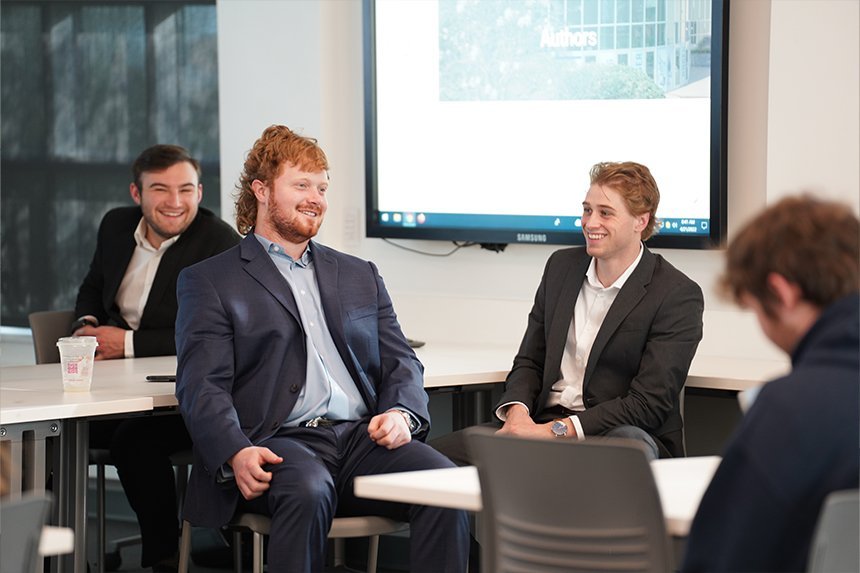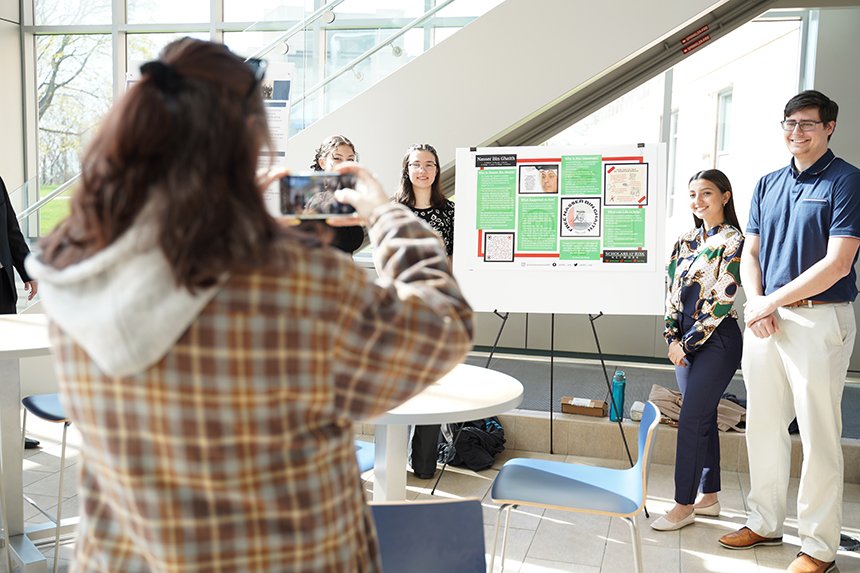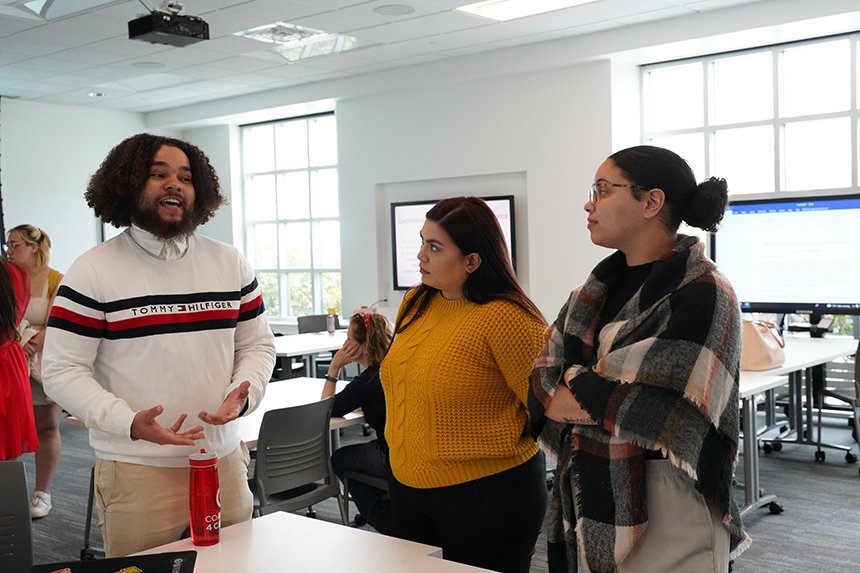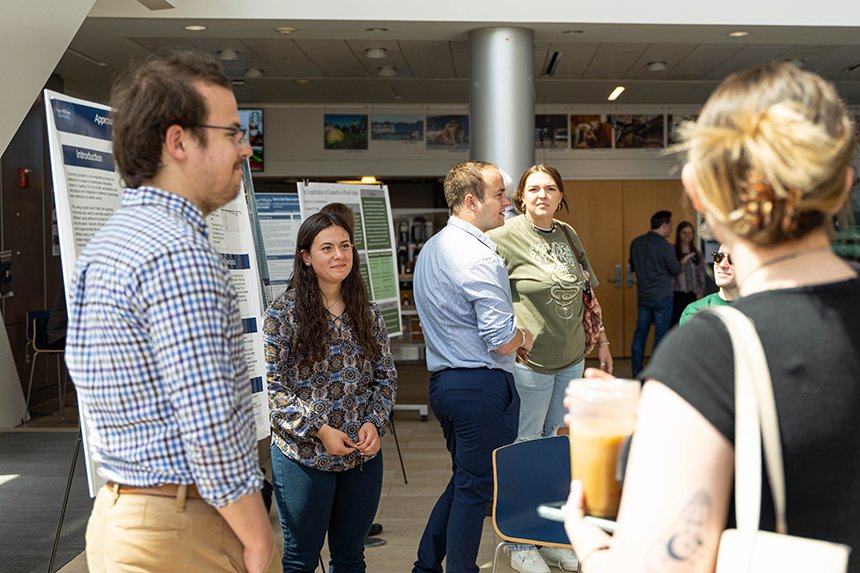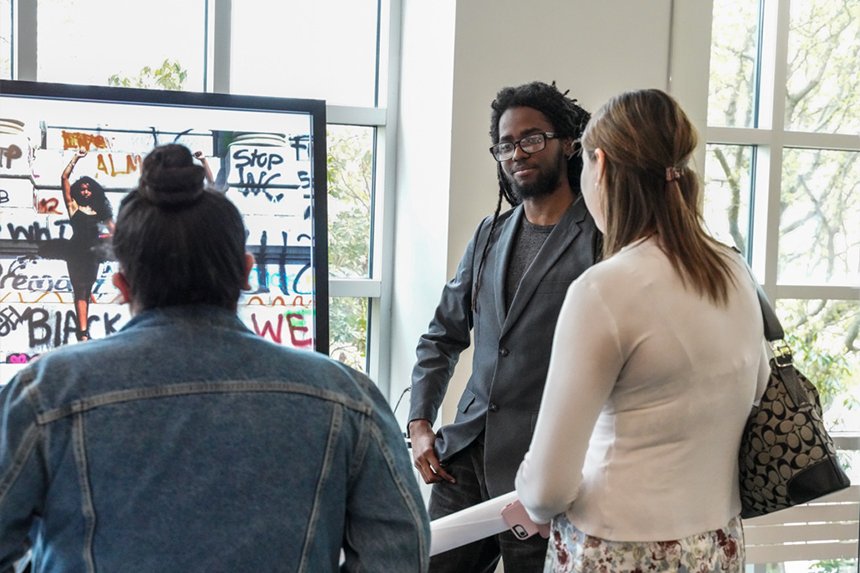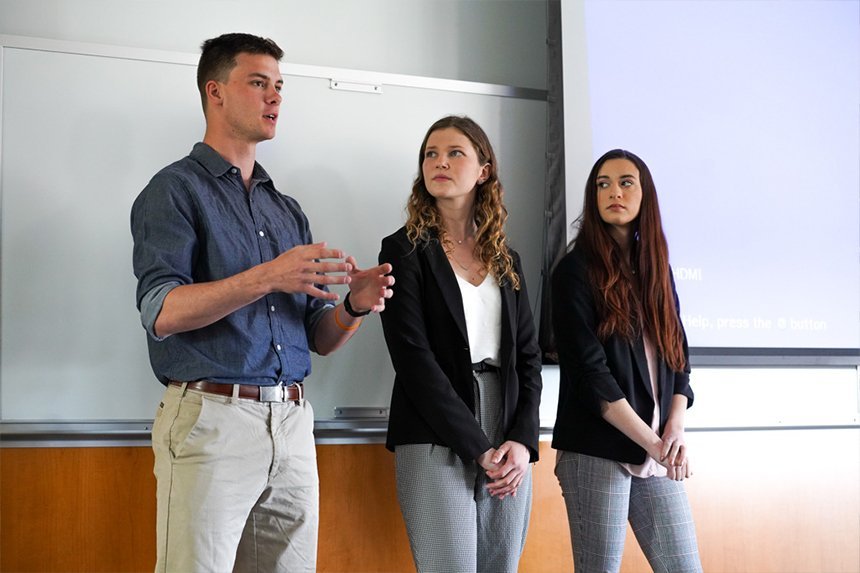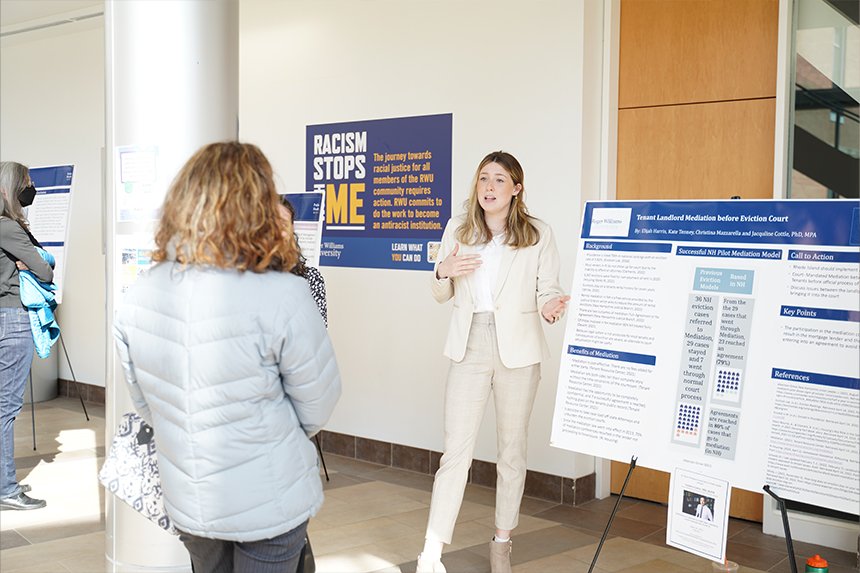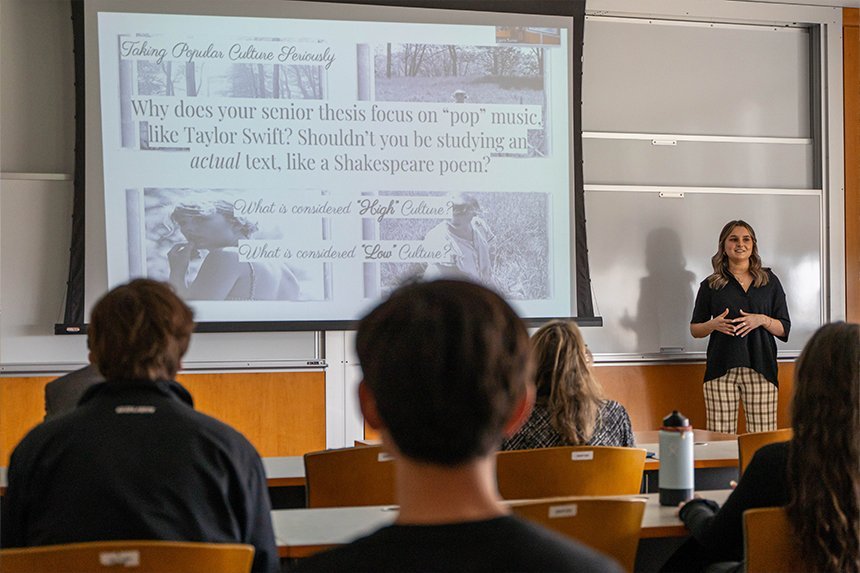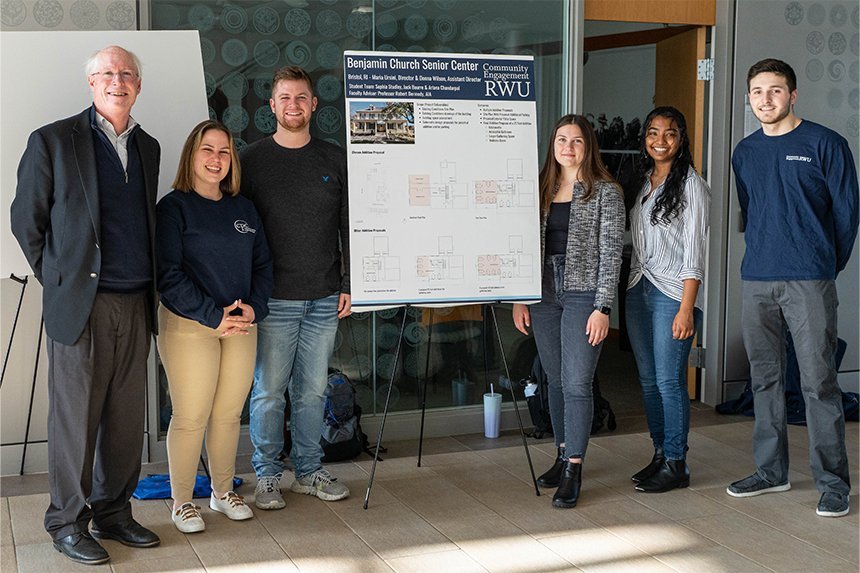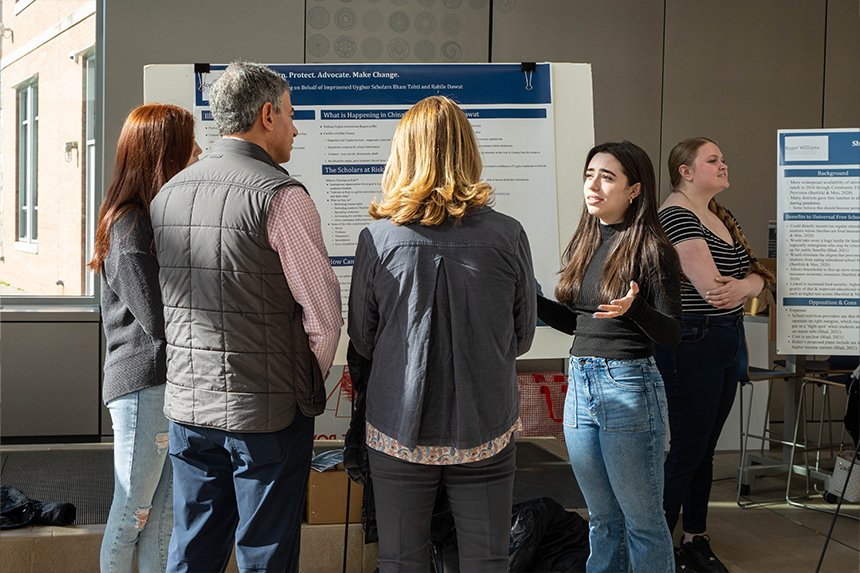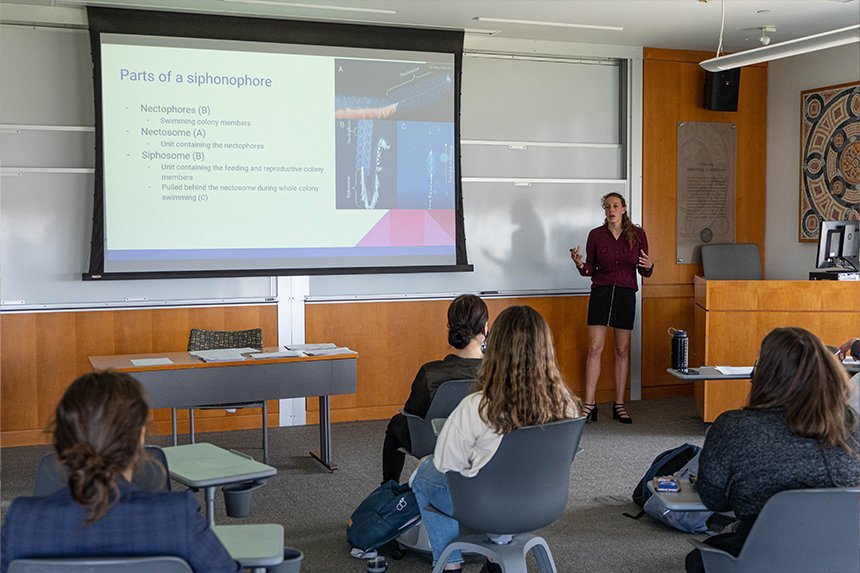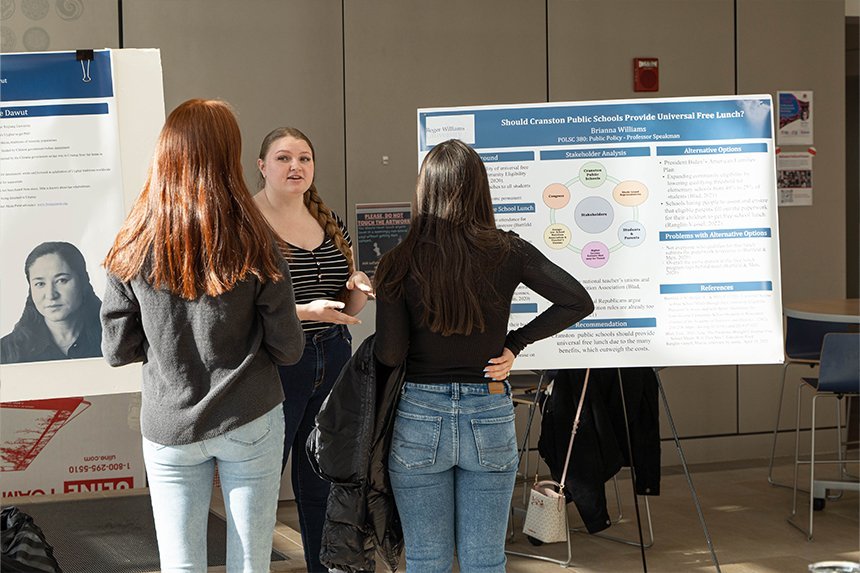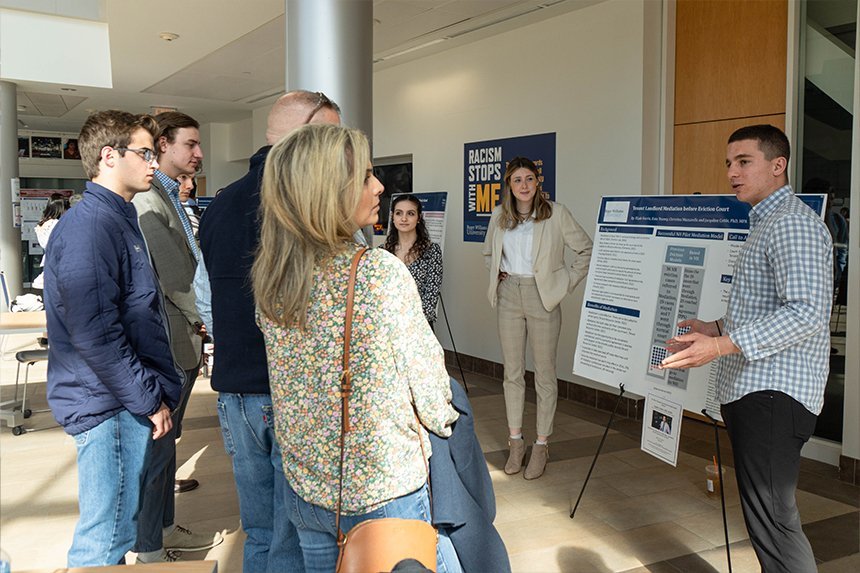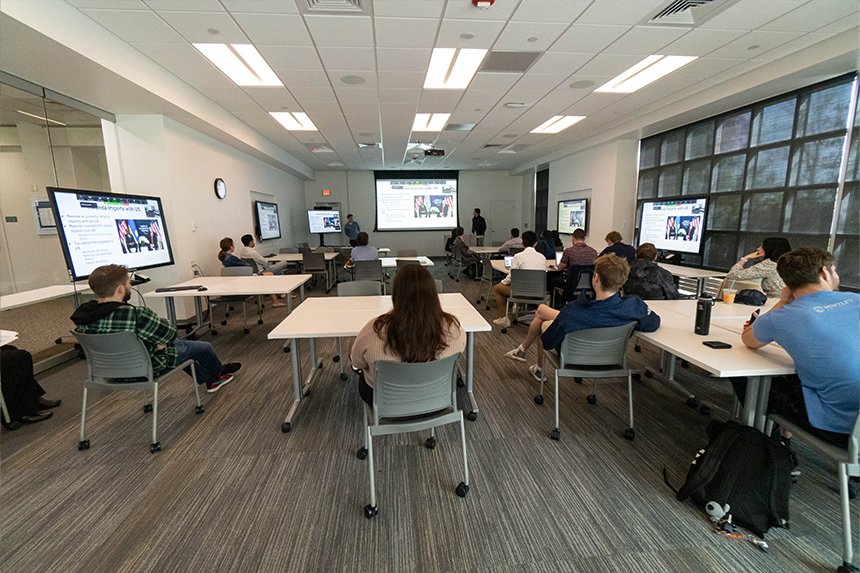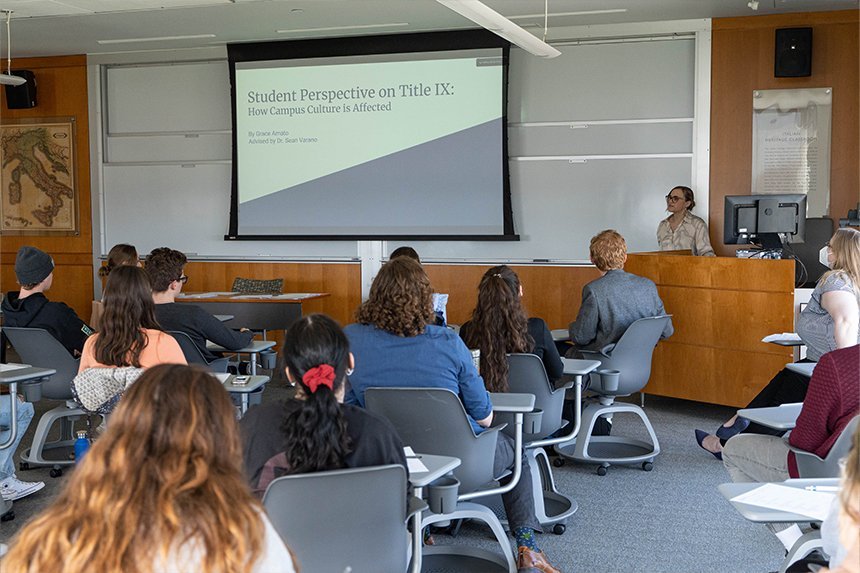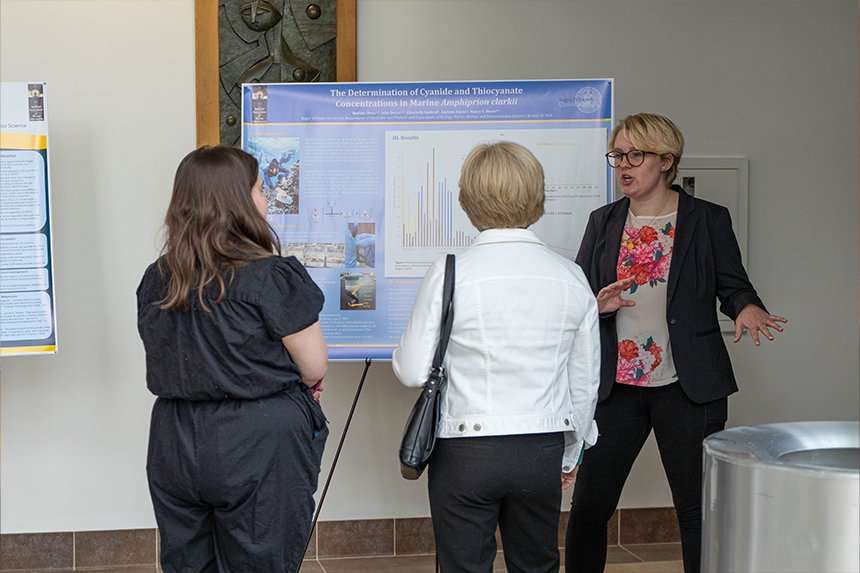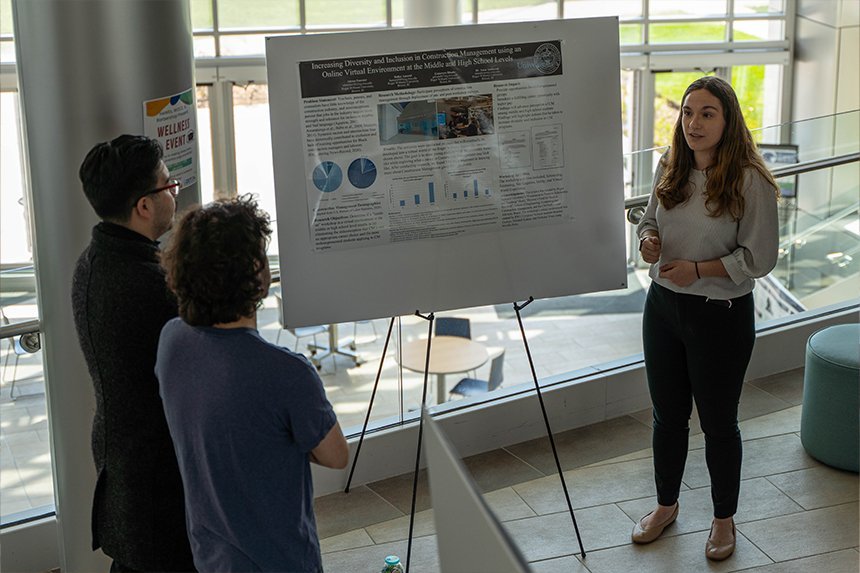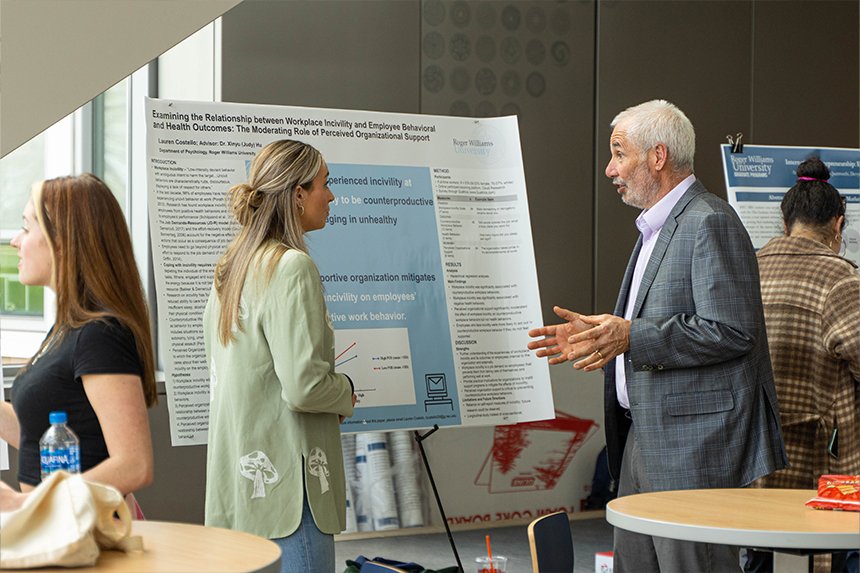SASH: An RWU Tradition Celebrating Student Research and Creativity
At the ninth annual Student Academic Showcase and Honors (SASH), students presented research and capstone projects to faculty, staff, and their peers, and also held panel discussions, a music showcase and more.
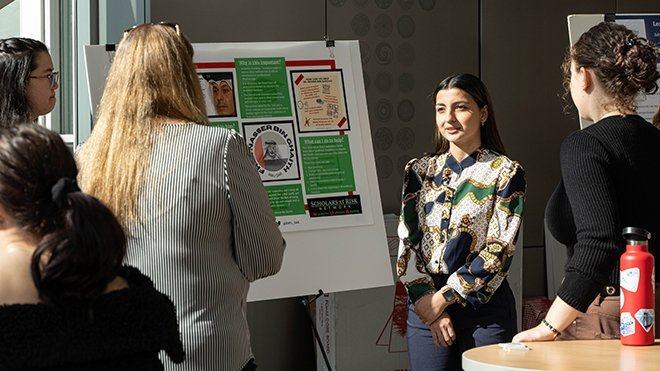
BRISTOL, R.I. – Research and creativity are an integral part of the RWU experience. Each year, the university showcases the exciting and innovative research projects taking place across all schools and programs at the Student Academic Showcase and Honors (SASH).
“At RWU, we strive to provide students with many opportunities for experiential learning as possible. This includes internships, study abroad, community engaged learning, and research,” said Provost Margaret Everett. “Our faculty include students in all phases of their research, including conference presentations and publications. SASH is such a great opportunity to showcase the great work that students are doing and the impact of their projects.”
On Thursday, students presented research projects, Honors Capstone projects, senior theses, and culminating creative projects at the ninth annual SASH event.
“SASH is an opportunity for students to tell their stories to people other than their professors and for students to learn from their peers,” said William Palm, Director of the University Honors Program. “They are proud to show off their work and to talk about the projects that they put so much effort into.”
Here is a sampling of the many research projects shared at SASH 2022:
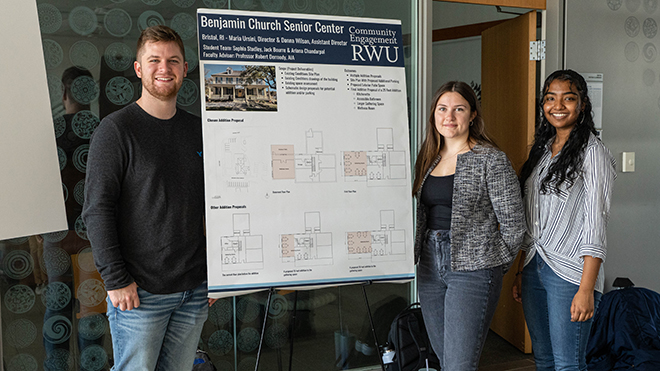
Designing a Senior Center Expansion
To design the future of Bristol’s Benjamin Church Senior Center, Architecture majors Jack Bourre, senior from Bellingham, Mass., Ariana Chandarpal, first-year student from Meriden, Conn., and Sophia Studley, junior from Milford, Mass., looked to the past. They visited the Bristol Historical Society and researched archival architectural designs to uphold the integrity of the historic Senior Center, built in 1908, as they developed plans for an expansion.
“Everything in the old documents was hand drawn. We do so much on the computer now, so it was impressive to see that they had to do it all by hand at one point, even little details,” said Studley.
This project was part of RWU’s Design and Research Team, a decade-long initiative linking architecture students with community partners for engaged learning experiences. Professor of Architecture Bob Dermody, who mentors the Design and Research projects, has seen the impact this work has on students’ internship and career opportunities.
“Students go to interviews and come back saying, ‘I just told them what I did on the Design and Research team.’ Having run small projects sets them apart,” said Dermody.
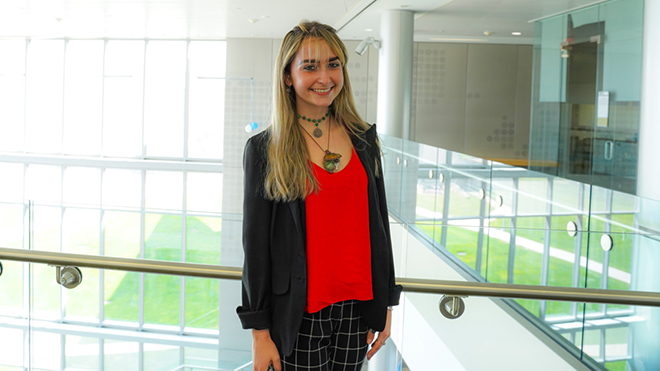
Cleaning Rhode Island’s Shorelines
Senior Environmental Science major Kelsey Wells, of Albany, N.Y., has picked up a lot of Del’s Lemonade cups during her beach cleanups in the greater Bristol, R.I., area.
Wells, who’s minoring in both Marketing and Sustainability Studies and serves as president of both Eco Reps and the Sustainability Club at RWU, saw years of personal and professional work culminate in her Honors capstone presentation, “The Effect of Shoreline Type on the Abundance and Distribution of Marine Debris.”
“The majority of beach cleanups are done on sandy shorelines with no real standardized protocol for rocky shorelines that characterize beaches here in Rhode Island,” said Wells, who was a marine debris intern for Clean Ocean Access last summer. “It’s been hypothesized that rocky shores can lead to the creation of microplastics, which is a very big problem.”
Instead, after visiting six beaches in the greater Bristol area, Wells found that sandy beaches, which attract more tourists, tend to have more debris and microplastics. She thinks cleanup efforts are not as effective as they could be.
“I would love to work in sustainability. It’s something that I’m passionate about,” Wells said about her post-Roger goals. “Marine debris is one of the biggest issues that humanity is facing right now. I would ideally like to continue research into microplastics because … it’s really going to have a big impact on the marine environment.”
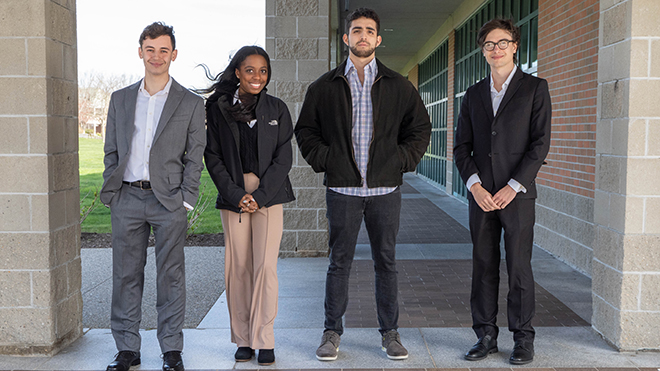
Greece Through an International Business Lens
You may have studied Ancient Greece, but do you know about modern Greece’s economic and social place in our globalized world? Senior International Business majors Jaslene Bourdeau of Stamford, Conn., Samuel Figgie of Bernardson, Mass., and Novian Rivera of Windsor, Conn., and junior Web Development major Isaac Ruiz of Westchester, N.Y., presented their in-depth research on Greece in their presentation “Responsible Business Conduct & Due Diligence: Greece.”
“Being from the United States, there are a lot of countries that we don’t hear much about. Through researching Greece, we were able to gain insight that we can use to understand other European Union states. It creates a foundation for knowledge,” said Ruiz.
Their presentation covered Greece’s demographics, economics, infrastructure, technology, sustainability, corporate social responsibility, and other strengths and challenges.
“I got to look outside of the U.S. to see how different countries operate, especially those in the E.U. I’m going to take that with me in the future, because having a background of knowledge about these different countries will help me in my career,” said Bordeau.
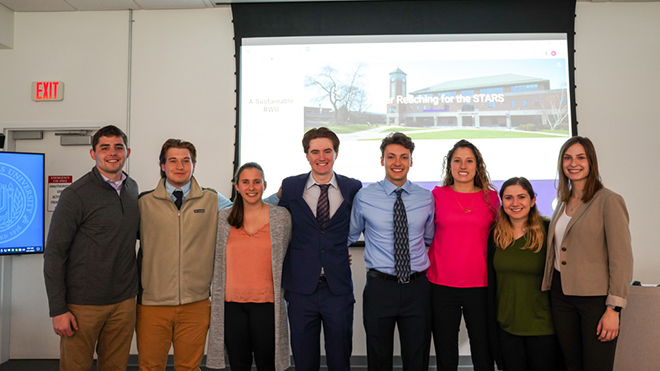
Improving Sustainability for Dining Services
Working with Bon Appetit, five RWU students proposed solutions for increasing sustainability in RWU’s dining services program, as part of their presentation “Roger Reaching for the STARS: Sustainable Dining.” Their group was one of four presenting on ways to improve sustainability on RWU’s campus, as part of the Sustainability Studies capstone course.
Nikki Rosa, a junior Biology major with minors in Sustainability Studies and Math from Nahant, Mass., and senior Architecture majors minoring in Sustainability Studies Sydney Rubin, from Cranbury, N.J., Jordan Peck, from Enfield, N.H., and Jayson Schlosser, from Plymouth, Mass., collaborated with Bon Appetit and RWU staff to determine the ways in which dining services is already implementing sustainable practices and where there are places for improvement.
“Roger Williams is already doing a great job with sustainable dining. At Upper Commons, there’s nearly zero waste, using biodegradable napkins and reusable silverware and plates,” said Rosa, a member of the women’s basketball team who said she was curious about dining programs’ sustainability after traveling to away games and dining at other schools.
But as the students learned through their research, there’s still work to be done: there is still food being wasted on campus, and Lower Commons could be improved by reducing waste through single-use plastics and having a more efficient plan for to-go containers, they said.
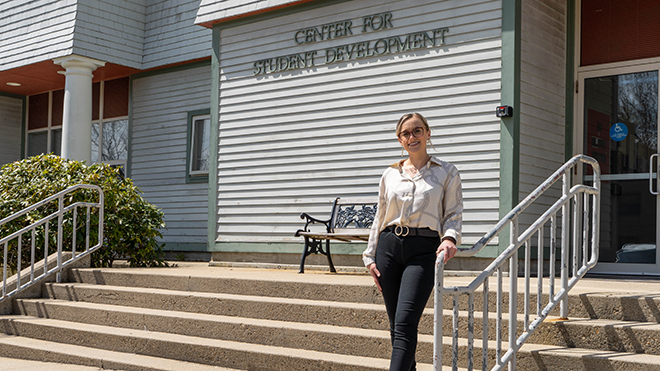
Advocating for Title IX Awareness
Do RWU students understand the protections they are awarded under Title IX regulations? Senior Criminal Justice major Grace Amato of West Hartford, Conn., presented the research she conducted to find out.
“Knowing what support systems or resources there are out there for students is a matter of campus safety,” said Amato. “It’s why we have the Title IX Student Task Force and the Campus Culture of Respect Team to improve Title IX presence on campus and make it safer for everyone.”
In her Honors Capstone presentation, “Student Perspective on Title IX: How Campus Culture is Affected,” Amato surveyed RWU students on their perception of Title IX and analyzed her results. Of her survey participants, 96% of female identified students and 92% of male identified students agreed that they knew what Title IX was.
Since her first year at RWU, Amato has taken advantage of every opportunity to get involved in RWU’s Title IX Office. After graduating in May, she will go on to earn her Master’s in Criminal Justice in one year through RWU’s B.S./M.S. Criminal Justice 4+1 program.
“I can get a jumpstart on the rest of my life outside of academia by getting my Master’s in only one year instead of two or three,” said Amato.
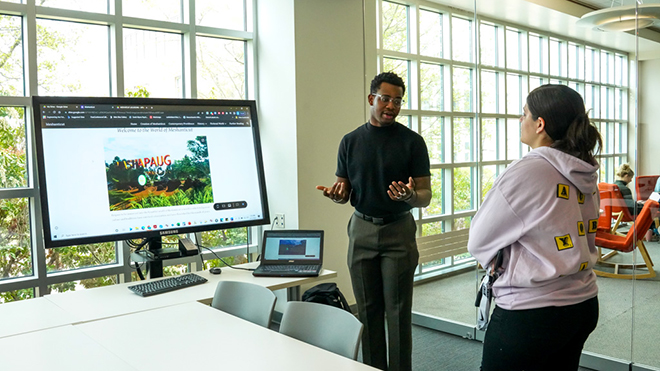
Educational Interventions for Racial Justice
A computer game that shows the city of Providence, R.I., if Indigenous cultures and traditions had survived colonization, a syllabus proposal for a Cultural Studies course titled “Confronting White Privilege in White America,” a model for teaching school counselors antiracist practices, and a social media campaign on deconstructing myths surrounding critical race theory are a few of the student projects to come out of the course, Racial Justice in the Classroom: Becoming an Antiracist Mentor for Underserved High School Youth.
As part of the year-long course, co-taught by Kamille Gentles-Peart, associate professor of Communication and Media Studies, and Laura D'Amore, chair of the Department of History and Cultural Studies and associate professor of Cultural Studies, BIPOC and first-generation college students at RWU learn and participate in the restorative work of antiracist mentoring. Students also partner with the community organization Breakthrough Providence.
“Our goal is to focus on centering BIPOC students,” said Dominion Emmanuel, a junior Legal Studies and Cultural Studies double major, from Burlington, Mass., who created the game, Meshanticut, which highlights nine Indigenous neighborhoods in Providence, with the hope of actually creating the game with a virtual reality component for high school students to use.
While taking the course, RWU students have also been mentoring high school students in Providence from underserved communities, D’Amore said. “Their final project was to create any kind of intervention on behalf of racial justice in order to combat inequity in schools.”
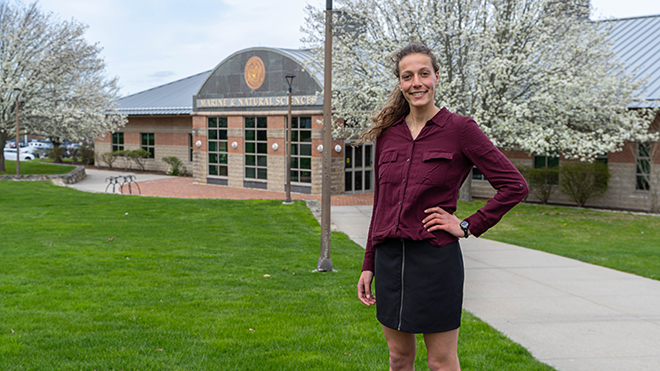
Years of Research Yields Results
Senior Marine Biology and Environmental Science double major Shirah Strock of Castleton-on-Hudson, N.Y., saw three years of research come to a culmination in her Honors Capstone presentation “Siphonophore Swimming Kinematics and Coordination.”
“It was exciting to see years of research come to conclusions with hypotheses resolved,” said Strock. “I wanted to get into research as soon as I could. I started in my freshman year.’
Strock studied swimming kinematics and patterns in siphonophores, colonies of single-celled marine organisms. Her results showed that the siphonophores use a particular wave pattern for swimming, communicating to create the coordinated pattern.
“Going through this whole research process I of course learned a lot about siphonophores, but I also learned a lot about data analysis and how important it is in scientific research. Skills in data analysis will be important for any future research that I do,” said Strock.
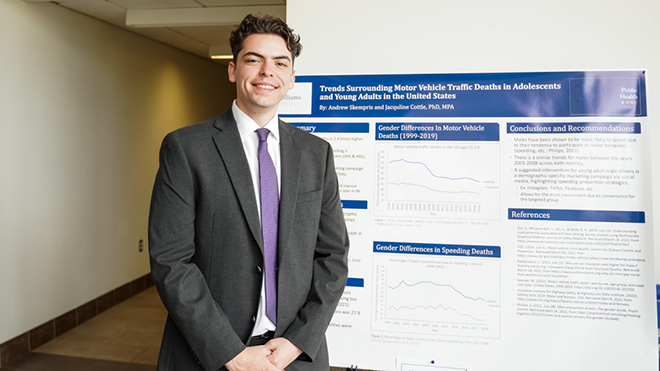
Mitigating Adolescent Driver Crashes
As an intern at Youth Driven, a traffic safety and leadership program in Bristol, R.I., Andrew Skempris, a senior Forensic Science and Public Health double major who’s minoring in Criminal Justice, has been curious about trends surrounding motor vehicle deaths among adolescents, ages 15-24.
“That age group feels invincible,” he said. “They’re more likely to participate in riskier behaviors.”
Skempris, of Terryville, Conn., combined his internship with research for his Public Health capstone project and presented his findings in “Trends Surrounding Motor Vehicle Traffic Deaths in Adolescents and Young Adults in the United States.”
Through his research, Skempris discovered that the rate of motor vehicle traffic deaths is 2.4 times higher for male-identifying drivers than female-identifying drivers. “I was a bit shocked to see that males are more prone to be getting into fatal accidents,” he said. “Females are more prone to have serious injury. I need to do more research.”
What can be done to mitigate this? Skempris’ idea is to create a targeted social media campaign to raise awareness for safer driving practices, specifically regarding speeding, he said. Post-RWU, Skempris said he wants to work with adolescents, specifically in the field of higher education.
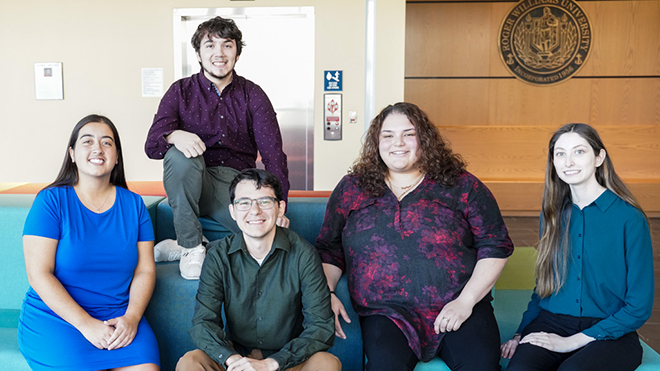
Engineering a Way to Keep Nemo Alive
In an interdisciplinary project, senior Mechanical Engineering majors Jacob Champlin, of Bristol, R.I., Alexa Dicesare, of Norwood, Mass., Ignacio Monje, of Worcester, Mass., Angelique Rivera, of North Bergen, N.J., and Kaitlyn Sample, of Wakefield, Mass., worked with Andrew Rhyne, professor of Marine Biology, to solve an issue at the Marine and Natural Sciences Wet Lab.
In their presentation, “Keeping Nemo Alive: Design and Implementation of a System to Control EMI in Aquarium Systems,” the students explained that ballasts, which are used to power UV sterilizers in the MNS Wet Lab to help maintain safe living conditions for aquatic life, including clownfish, have been emitting electromagnetic interference. This EMI causes faulty readings in tank sensors, which are used to detect water quality, which then disrupts data collection.
“Our job is to fix that problem,” Champlin said.
In addition to determining a potential solution – putting Faraday boxes around the ballasts to stop EMI – the students said that through their research, they learned a lot about the design process, as well as about different materials and equipment that can be used.
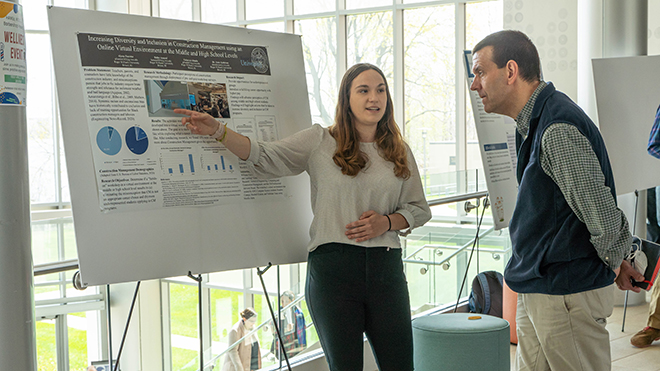
Inspiring Diversity in Construction Management
First-year Construction Management major Jennifer Gomez of Providence, R.I., wishes she was told about construction management when she was in high school.
“I didn’t know what it was. I had no idea it was even a major,” she said.
Junior Construction Management majors Bailee Amaral of East Freetown, Mass., Alyssa Foerster of Camp Hill, Pa., and Guinevere Rhuda of Wakefield, Mass., are working to spread awareness of construction management to increase diversity in the field. They developed a program for high school students, to encourage women and people of color to pursue the career.
Computer Science students developed a Construction Management virtual reality experience which Rhuda, Amaral and Foerster could bring to local high schools. Their research showed that 15% more students expressed interest in going into construction management after attending their presentation.
Gomez and Rhuda met at SASH and plan to work together to bring this program to Gomez’s high school, further expanding its reach.
“We’re hoping to branch out and really get this program out there,” said Rhuda.
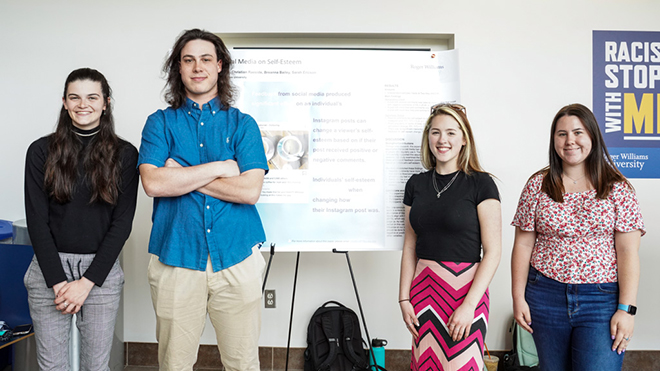
The Psychology of Social Media Comments
Research has long shown that social media can negatively impact how individuals feel about themselves, but a group of Psychology majors wanted to dive deeper into how comments and likes are affecting people’s self-esteem.
In their presentation, “The Effects of Social Media Characteristics on Self-Esteem,” seniors Breanna Bailey, of Raynham, Mass., who’s also minoring in Film Studies; Madison Hollen, of Portsmouth, R.I., who’s also minoring in Theater; Kara Rydelek, of Trumbull, Conn., who’s also majoring in Music; Christian Raeside, of Norwell, Mass., who’s also majoring in Legal Studies; and Sarah Erickson, of Barrington, R.I., a student at Loyola University, surveyed RWU students and found that comments, both positive and negative, on social media posts will more likely affect someone’s self-esteem than how many likes their post receives.
“This study is so relevant because social media just continues to grow,” said Rydelek, who wants to pursue a career in music therapy. “The more research and application of showing how it is on mental health, maybe that can further lead to some changes on the (social media) platforms.”
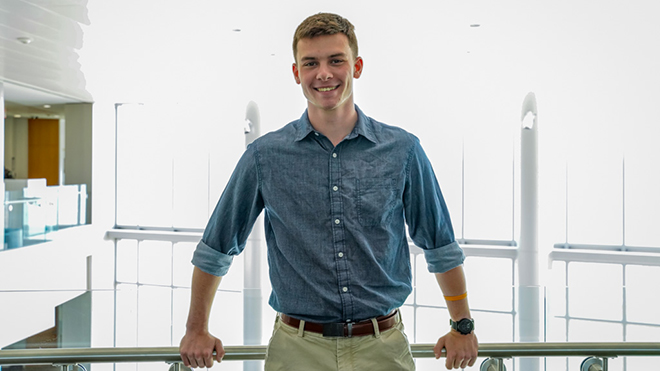
Recommendations for the FANS Lab
As part of his Honors capstone project, senior Cybersecurity major Kasey Litchford looked at ways to improve the Forensics and Applied Networking Security (FANS) Lab, currently housed in the Gabelli School of Business, and learned that not many people on campus know about this resource, which can increase access for students and faculty working remotely.
Information Technology resources are often underutilized, said Litchford, of Ashland, Mass., who has three minors in Computer Science, Military Science, and Digital Forensics. After conducting this research, his recommendation is to “develop a working relationship with those that administer your technology,” he said. “This network is for anyone who needs to use it.”
Working on this research ties into Litchford’s future career plans, he noted. A member of the Reserve Officers’ Training Corps, he will go on to work in the Cyber branch of the U.S. Army after he graduates in May, and said his experiences in the Cybersecurity program at Roger have prepared him for this next step.
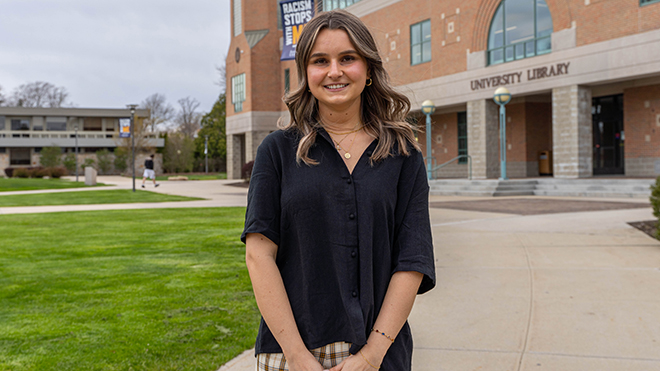
Taking Pop Culture Seriously
Some students focus their senior theses on Shakespeare. Olivia Dell Isola, senior Secondary Education and English double major from Lynnfield, Mass., instead chose Taylor Swift. She presented her thesis, “Storytelling through Folklore,” a close reading and analysis of Swift’s Folklore album.
“The goal of my thesis was to focus on the question of should we take pop culture seriously. What is high culture? What is low culture?” Dell Isola asked.
Dell Isola concluded that researching popular culture is valuable because of the unique ways it reflects the ideals of our society and culture. She shared her work with high school students in her student teaching placement and noted their response.
“My students got a kick out of the fact that I was writing about Taylor Swift because I had a lot of huge Taylor Swift Fans. Some of my students asked me to send my thesis to them so they could read it. It is great to be able to connect with the students in that way,” said Dell Isola.
She intends to provide her future students with opportunities to apply literary analysis to popular culture to promote student engagement.


